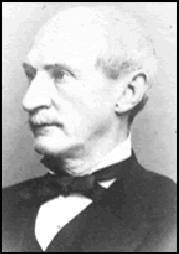The Civil War News & Views Open Discussion Forum

Brigadier-General Alpheus Baker
Brigadier-General Alpheus Baker was born at Clover Hill,
Abbeville district, SC, May 28, 1828. His father, an eminent
teacher and scholar, was a native of Massachusetts, and his
mother, a Miss Courtney, a native of Ireland.
Alpheus Baker was educated by his father, and he began to
teach school himself before he was sixteen years old. He was
successful in this profession at Abbeville, SC, then in
Lumpkin, GA, and lastly in Glennville, Barbour county, Ala.,
where he settled in 1848.
Meanwhile he had been studying law. Being admitted to the bar
in 1849, he opened his office in Eufaula and began to
practice. His success was wonderful. In 1856 he accompanied
Major Buford to Kansas, and returned to rouse the people to
the importance of making Kansas a slave State, thinking that
this would restore the equilibrium between the free and the
slave States, and prevent the inevitable conflict between the
two sections.
In 1861 he represented Barbour county in the constitutional
convention, but resigned his seat to go into the army, as
captain of the Eufaula Rifles, which he led to Pensacola.
This company had on its rolls at Pensacola the names of fifty
persons who afterward became officers.
In November he went to Fort Pillow, above Memphis, where he
was elected colonel of a regiment made up of Tennessee,
Mississippi and Alabama troops. This regiment was in the
siege of New Madrid, and was captured at Island No. 10, April
10, 1862.
In September of that same year Colonel Baker was exchanged,
together with his regiment. At that time four Alabama
companies took the place of the four from Tennessee, and the
regiment, under the name of the Fifty-fourth Alabama, gladly
received Alpheus Baker as its colonel.
It fought at Fort Pemberton, on the Yazoo, where General
Loring commanded, and at Baker's Creek, where Colonel Baker
was wounded in the foot. On March 5, 1864, he was assigned to
brigade command of the Thirty-seventh, Fortieth, Forty-second,
and Fifty-fourth Alabama regiments.
He led this brigade through the entire campaign, from Dalton
to Atlanta. At Resaca his horse was killed under him, and
near Atlanta he was slightly wounded, at the battle of Ezra
Church, July 28th. Baker and his brigade were next near
Mobile in the department of the Gulf.
In January, 1865, they went to the Carolinas to engage in what
proved the final campaign, and at Bentonville, though
numbering only 350 muskets, captured 204 of the enemy.
Upon the return of peace General Baker gave his whole
attention to the practice of law. He was an able orator, who
pleased by his eloquence and humor, and convinced by his
argument.
In 1878 he removed to Louisville, where he soon made many new
friends, and at once took rank among the foremost of the bar
of Kentucky. General Baker was a brave soldier, a strong
lawyer, an accomplished gentleman, and a devout Christian.
His useful and honorable career came to a close by his death
at Louisville, Ky., October 2, 1891.
Source: Confederate Military History, vol. VIII, p. 386
A slave named Paris served as Body Guard of Col. Alpheus Baker. Faithfully attended Col. Baker from the beginning of the war and was captured with him at Island No. 10. Escaped and reached Columbus, Ga. after two weeks. Returning to Barbour County, Ala. his master's place of residence.
Messages In This Thread
- Yes, There Were Black Confederates
- Re: Yes, There Were Black Confederates
- Re: Yes, There Were Black Confederates
- Re: Yes, There Were Black Confederates
- Re: Yes, There Were Black Confederates
- Re: Yes, There Were Black Confederates
- Re: Yes, There Were Black Confederates
- Re: Yes, There Were Black Confederates
- Re: Yes, There Were Black Confederates
- Re: Yes, There Were Black Confederates
- Re: Yes, There Were Black Confederates
- Re: Yes, There Were Black Confederates
- Re: Yes, There Were Black Confederates
- Re: Yes, There Were Black Confederates
- Re: Yes, There Were Black Confederates
- Re: Yes, There Were Black Confederates
- Re: Yes, There Were Black Confederates
- Re: Yes, There Were Black Confederates
- Re: Yes, There Were Black Confederates